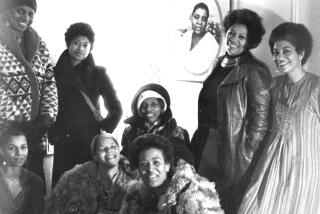THE HUMAN CONDITION / SIBLING RELATIONSHIPS : Sisterhood Is Powerful
- Share via
Their sisterly relationship rivals a marriage--right down to the sleeping arrangements.
“When she comes to visit, we sleep in the same bed,” says syndicated advice columnist Abigail (Dear Abby) Van Buren of her sister, Ann Landers. (Abby’s husband, meanwhile, sleeps in another room.)
“When we’re together, we talk all night,” adds Landers, who did not live apart from her identical twin for even one day until the two married in 1939--in a double wedding, of course.
“We did have problems at one time. It’s all gone and forgotten,” says Landers.
But now, “When we’re apart, we fax each other several times a day,” says Ann, who lives in Chicago. Abby lives in L.A. “The telephone can ring at just the wrong moment, but you can pick up a fax when you want to.” While few women might be as tight as Ann and Abby, the bonds between sisters tend to be the strongest of all sibling relationships, according to researchers. Not because playing with Barbie and Midge inspires greater closeness than horsing around with Spider-Man and Terminator action figures. Rather, the experts claim, it’s because women are better at expressing their emotions, the loaded arena that determines whether relationships are cozy or distant.
“Our research has shown very consistently that sisters all across the life span have much closer relationships than brothers do. It’s almost startling,” says medical sociologist Deborah T. Gold, assistant professor of psychiatry at Duke University Medical Center.
“Women have less difficulty with communication than men do. It seems that siblings in adulthood who have good, positive relationships base that on strong communication.”
“In general, researchers have found that the closest, most longstanding relationships are between sisters,” says Jane Mersky Leder, author of “Brothers & Sisters: How They Shape Our Lives.” “The next closest are between sisters and brothers and the least close is between brothers.”
“The mixed pairs seem much more like pairs of sisters than pairs of brothers,” Gold observes. “To me, that tells us that it’s the presence of a woman . . . that makes the difference and not necessarily the presence of two women.”
That such findings aren’t very precise points out a prime difficulty in discussing sibling relationships with any authority. Very little research has been done on the influence of brothers and sisters as opposed to, say, the influence of parents.
“We know so much about our parents, and what they did right, what they did wrong, and the effect that their parenting--or lack of it--had on us, but when it comes to our brothers and sisters, we are strangely inarticulate,” says Leder.
“The truth is that we spend more time with our siblings during childhood and adolescence than we do with our parents and clearly their influence is enormous. It may be positive, negative or ambivalent, but it’s enormous.”
Indeed, as Purdue University’s Victor Cicirelli describes the research on sibling relationships, “There’s a lot of virgin territory here.”
A professor of developmental and aging psychology, Cicirelli has studied siblings for 15 years and, like Gold, he’s found that sisters clearly have closer relationships.
“The consequence of this . . . is greater self-esteem in sisters. They stimulate it in each other,” he says. “We have found that in terms of good relationships, sisters feel a greater sense of need and concern about helping and supporting each other. They seem to be so much more socially stimulating to each other.”
Leder, who interviewed Cicirelli, Gold and others for her book, says studies show that “both men and women tend to name sisters as the ones to whom they feel the closest. Sisters seem to be singled out as the ones who keep family ties alive and who earn the love and respect of their other siblings.”
Leder, who has a sister six years her junior, recalls that they were not particularly close growing up.
“That six years seemed like a lifetime. But as I approached my 40th birthday, I began the process of reconnecting. I now consider her not only my sister but one of my best friends.
“I think there is nothing more compelling than the psychological bond that exists between sisters. We’re not only peers. We’re family.”
But what about sisters who don’t fit the pattern? How do you explain the La Toya Jacksons of the world?
Leder says that factors working against close sibling relationships include a lack of access to the sibling and how they are treated by their parents.
Mothers and fathers who play favorites or compare siblings--male or female--even positively, might be setting up competitive rather than cooperative relationships, Leder contends. She’s quick to point out, however, that siblings who don’t get along as children needn’t be burdened with difficult relationships throughout their lives.
“Clearly, the more alike we are, the better chance we have of getting along. But if we don’t get along, that doesn’t mean we can’t reconnect as adults. The vast majority of us, whether we’re sisters or brothers, can look forward to minimally congenial relationships with our siblings in later life and optimally, to very close, loving relationships,” she claims, basing her conclusion on her interviews with 125 brothers and sisters as well as the work of other researchers.
She says the number of siblings who are going to take the hurt and humiliation from the past and carry it into the present and future is small--no more than about 10%.”
To drop the baggage of hostility might not be easy, though. “The process of forging a relationship with a sister or brother is like any other,” Leder cautions.
“And it’s best not to jump in and tackle areas that caused the difficulties in the first place. You have to develop trust slowly. Then, in a very respectful, non-judgmental way, you can discuss the problems and solutions for whatever hurt may have existed in the past.”
And you can go on about rebuilding the relationship, at which sisters are supposed to be better.
Those who get really good at this might even reach the point where they can erase unpleasant memories completely, the way Abby seems to have done with her sister, Ann.
“There are always problems in all relationships,” the adviser allows.
Asked to be more specific, Abby simply replies, “I forgot it.”






